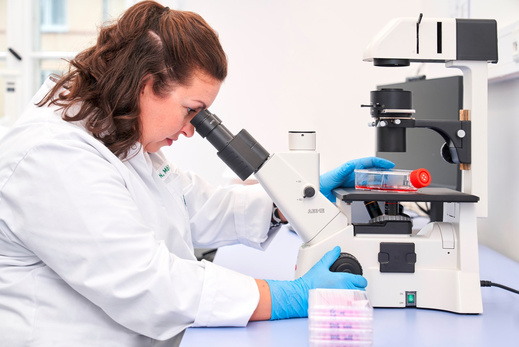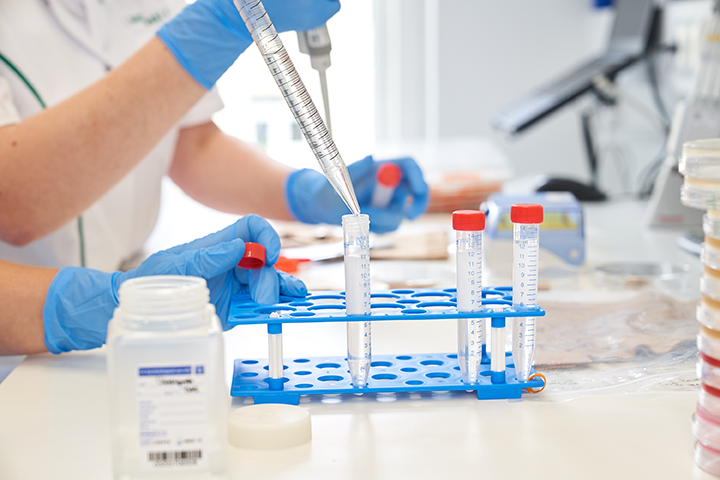ISO 22196 - Measurement of antibacterial activity
ISO 22196 (formerly JIS Z 2801) testing is essential to independently demonstrate the antibacterial activity of products such as surface materials, medical devices, packaging and household appliances.
When testing according to ISO 22196, samples of the material to be tested are produced and brought into contact with a defined amount of bacteria. The number of surviving bacteria is then measured and the antibacterial activity of the material is determined.
Product manufacturers who perform ISO 22196 testing demonstrate their commitment to quality and safety. By confirming ISO 22196 compliance, you can gain the trust of your customers and strengthen your credibility.
EN ISO 20743 Textiles - Determination of antibacterial activity of textile products
The tests according to DIN EN ISO 20743 (formerly JIS L 1902) are used to evaluate the antimicrobial activity of porous materials such as textiles. This standard specifies specific test methods and criteria for determining antimicrobial activity. With the EN ISO 20743 standard, textile products such as masks, protective clothing or bed linen can be tested for their antibacterial activity.
Give your customers the peace of mind of cleanliness and safety with textiles that have undergone comprehensive testing for antibacterial activity according to ISO 20743!
ISO 7581 - Evaluation of bactericidal activity of a non-porous antimicrobial surface used in a dry environment
Testing according to ISO 7581 makes it possible to determine the activity in inactivating bacteria and thus ensuring the protection of users. The testing of antibacterial activity ensures that these surfaces are hygienic and the risk of infection is minimized.
ISO 21702 - Measurement of antiviral activity on plastics and other non-porous surfaces
Testing according to ISO 21702 makes it possible to determine the effectiveness of plastics in inactivating viruses and thus ensure the protection of users. Testing for antiviral activity ensures that these surfaces are hygienic and the risk of infection is minimized.
Conducting ISO 21702 testing demonstrates a company's commitment to quality and safety. It offers customers, users and the public confidence and security by proving that the tested plastics have effective antiviral activity.
Trust us to ensure your plastics provide an antimicrobial layer of protection that effectively fights viruses, contributing to a safer environment.
ISO 18184 Textiles - Determination of antiviral activity of textile products
ISO 18184 testing focuses on measuring the antiviral activity of textile products. The test evaluates the material's ability to inactivate viruses and inhibit their replication.
The ISO 18184 standard can be used to test textile products such as masks, protective clothing or bed linen for their antiviral activity. Our test laboratory HygCen Germany GmbH offers you tests according to ISO 18184 recognized by the national accreditation body and thus a comprehensive assessment of the antiviral activity of textile products.
Contact us today and get the protection your customers deserve!
ISO 27447 Fine ceramics - Test method for antibacterial activity of semiconducting photocatalytic materials
Photocatalytic materials use light energy to break down harmful bacteria. By testing antibacterial activity, we can ensure that these materials are actually effective and provide reliable bacteria control. When it comes to determining the antibacterial activity of photocatalytic materials, we are your reliable partner!
Our testing laboratory HygCen Germany GmbH offers you tests according to ISO 27447 recognized by the national accreditation body. We know the specific requirements of ISO 27447 and can guarantee you professional and reliable testing.
Request your ISO 27447 test from us today and benefit from our expertise, state-of-the-art technology and compliance with international standards.
Advantages of antimicrobial activity testing
- Determine registration requirements
A necessary aspect for obtaining regulatory approval of your medical device in the EU market. - Risk minimization
An important part of your risk minimization plan, since as manufacturer you are liable for your product. - Economization
We can support your product design at an early stage and test preproduction models.





